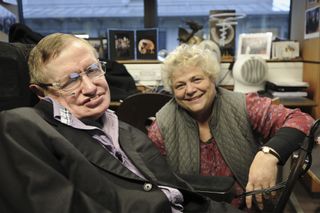Inside Stephen Hawking: PBS Documentary Explores Famed Scientist's Life Tonight
On the heels of his bombshell claim that black holes — as scientists have traditionally thought of them — may not exist, Stephen Hawking will tell the story of his life in a new PBS documentary that premieres tonight (Jan. 29).
Simply titled "Hawking," the TV portrait will follow the famed astrophysicist "from boyhood under-achiever to PhD genius, and from a healthy cox on the Oxford rowing team to diagnosis of motor neuron disease, given just two years to live — yet surviving several close brushes with death," according to PBS. The documentary will air at 10 p.m. EST (0300 Jan. 30).

In addition to showing his life an auditorium-packing public scientist today, the new documentary will provide a peek at Hawking's personal life: throwing parties, living at home with the help of his nursing team and searching for a faster communication system to help him speak, PBS officials said.
Stephen Hawking, who turned 72 this month, has lived for decades with motor neurone disease (also known as Lou Gehrig's disease), which has rendered his immobile and without the ability to speak. Today, Hawking communicates through an electronic voice system that allows him to select words by moving the muscles in his cheek.
Hawking made headlines this week after publishing a paper describing a new theory on black holes (which has not yet gone through peer review). In it, he quite controversially claimed that there might not be such a thing as an event horizon — the point at which not even light can escape a black hole — which, in turn, could mean "that there are no black holes."
Hawking is famous for this theoretical work, but he's also known to the wider public for his popular science books like "A Brief History of Time," published in 1988, and perhaps his numerous pop culture cameos, including appearing as a hologram on an episode of "Star Trek: The Next Generation" and in cartoon form on several episodes of "The Simpsons" and "Futurama."
"Hawking" will air again on Saturday (Feb. 1) at 10 p.m. EST.
Sign up for the Live Science daily newsletter now
Get the world’s most fascinating discoveries delivered straight to your inbox.
Follow Megan Gannon on Twitter and Google+. Follow us @SPACEdotcom, Facebook or Google+. Originally published on SPACE.com.












